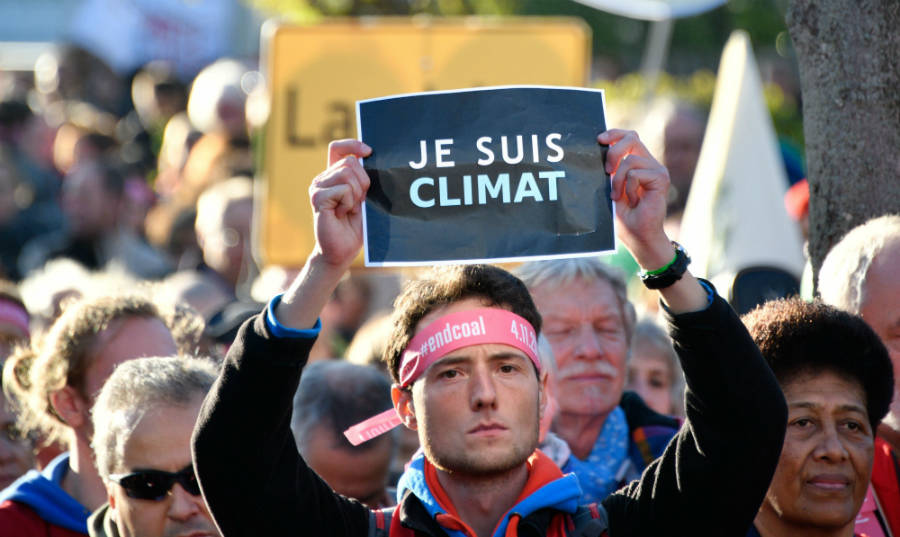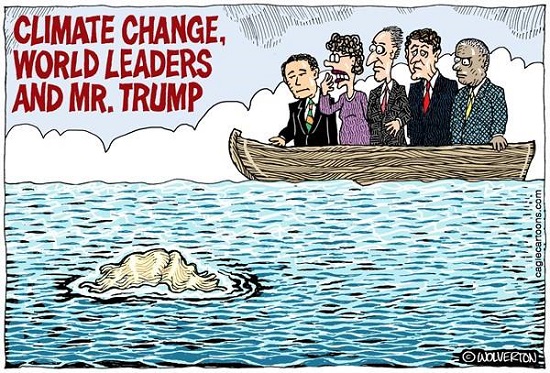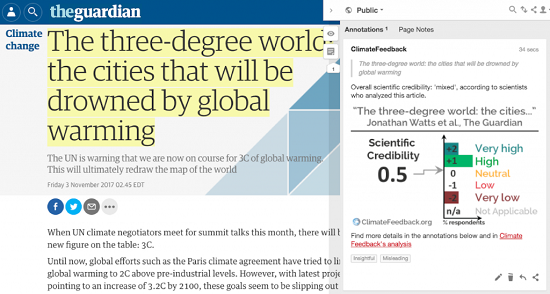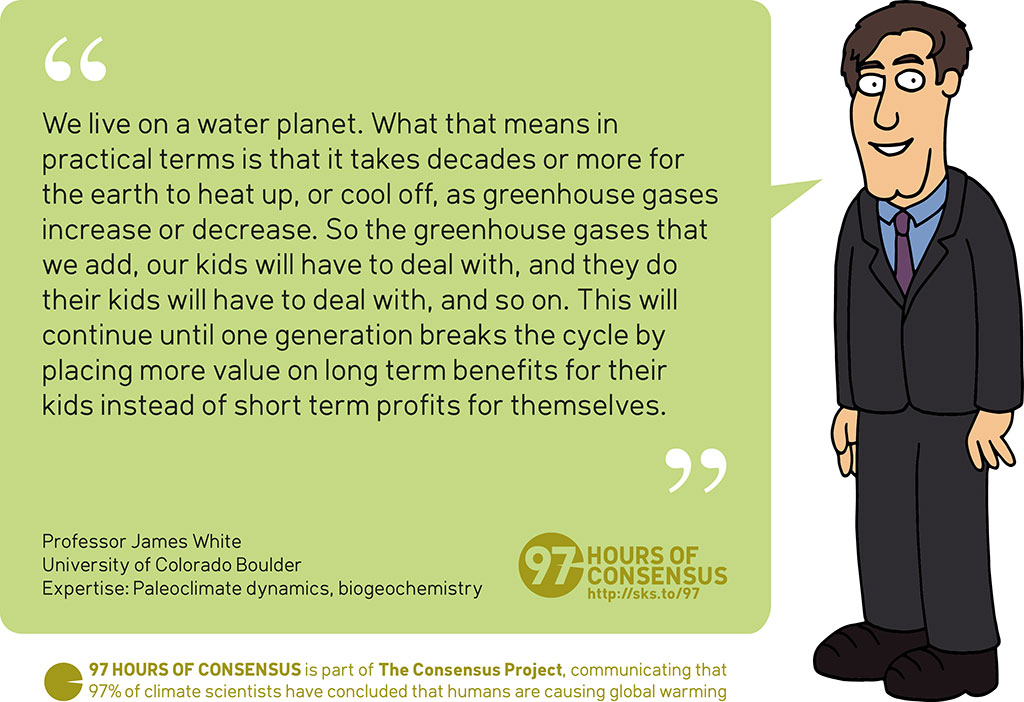2017 SkS Weekly Climate Change & Global Warming Digest #46
Posted on 19 November 2017 by John Hartz
Story of the Week... Toon of the Week... Quote of the Week... Coming Soon on SkS... Poster of the Week... Climate Feedback Reviews... SkS Week in Review... 97 Hours of Consensus...
Story of the Week...
UN Climate Talks Wrap Up with World Leaving Trump Behind
‘However much Trump wants to take us backward on climate change, the rest of the world — and the rest of the U.S. — is intent on moving forward.’

While protesters outside the UN climate talks urged an end to coal, a broad range of climate supporters spoke up inside, including U.S. states, cities and businesses that support great global ambition to rein in climate change. Credit: Sascha Schuermann/AFP/Getty Images
Two weeks of international climate talks in Bonn made only incremental progress toward resolving disputes that have been lingering since the Paris Agreement of 2015. The main achievement may have been cementing a firebreak to prevent the Trump administration from torching the whole process.
The strategy is to assert a broad new leadership among nations big and small, to bolster their resolve with high-profile commitments from American cities and states, to muster corporations and financial institutions in an attempt to kickstart renewable energy and assist poor countries, and to leave Washington isolated on the world stage.
It's a strategy pinned on the hopes—although diplomats would never put it so bluntly—that either Donald Trump will change his mind or that the United States will change its leader.
"The story of these climate talks was that however much Donald Trump wants to take us backward on climate change, the rest of the world—and the rest of the U.S.—is intent on moving forward," said Nathaniel Keohane, vice president for global climate at the Environmental Defense Fund.
UN Climate Talks Wrap Up with World Leaving Trump Behind by John H Cushman Jr, InsideClimate News, Nov 16, 2017
Toon of the Week...

Quote of the Week...
“This is the worst moment for the Americans to start behaving like a five-year old all of a sudden,” Christian Ehler, a German member of the European Parliament who speaks on EU and U.S. relations at the climate change talks, said in an interview. “The leader of the western world is stepping out of the multilateral framework used to tackle the most dramatic problem the world might be facing in the next 100 years.”
U.S. Is Acting ‘Like a 5-Year-Old’ Over Global Warming, EU Official Says by Jess Shankleman, Bloomberg News, Nov 17, 2017
Coming Soon on SkS...
- Pummeled by extreme weather, Americans are growing concerned about climate change (Dana)
- Analysis: WRI data suggests emissions have already ‘peaked’ in 49 countries (Zeke Hausfather)
- Guest Post (John Abraham)
- Impact of climate change on health is ‘the major threat of 21st century’ (Daisy Dunne)
- New research this week (Ari)
- 2017 SkS Weekly Climate Change & Global Warming News Roundup #47 (John Hartz)
- 2017 SkS Weekly Climate Change & Global Waming Digest #47 (John Hartz)
Poster of the Week...

Climate Feedback Reviews...

Climate Feedback asked its network of scientists to review the article, The three-degree world: the cities that will be drowned by global warming by Dom Phillips, Helen Roxburgh, Jonathan Watts, Josh Holder, Justin McCurry, Niko Kommenda, Richard Luscombe & Ruth Michaelson, Guardian, Nov 3, 2017
A majority of reviewers tagged the article as: Insightful and Misleading.
Review Summary
This story in The Guardian includes maps of, and reporting from, five coastal cities that will be affected by continued sea level rise. The story discusses the impact sea level rise will have on those cities, and what they are doing to prepare and adapt.
However, scientists who reviewed the story found that it fails to explain one very important thing to readers: nowhere is it explained that the magnitude of sea level rise shown (for a scenario in which the world warms by 3 °C) is the amount that would occur after the planet has had centuries to millennia to come into equilibrium with elevated temperatures. Readers are likely to assume that the story’s maps illustrate sea level rise that could occur before the end of the 21st century, but this is not the case.
See all the scientists’ annotations in context
UPDATE (15 November 2017): The article has been updated to include some explanation in an expandable box. It states, in part, “How quickly will oceans rise? It could take decades or centuries, but change will be locked in by a 3C temperature rise, which would extensively melt ice caps, shrink glaciers and thermally expand the oceans so many current coastlines and low-lying plains would be under sea level.”
Guardian explores sea level rise impact on cities, but fails to make timescale clear, Climate Feedback, Nov 10, 2017
SkS Week in Review...
- 2017 SkS Weekly Climate Change & Global Warming News Roundup #46 by John Hartz
- New research, November 6-12, 2017 by Ari Jokimäki
- California’s new law aims to tackle imported emissions by Zeke Hausfather (Carbon Brief)
- An Inconvenient Sequel – the science, history, and politics of climate change byJohn Abraham (Climate Consensus - the 97%, Guardian)
- Analysis: Global CO2 emissions set to rise 2% in 2017 after three-year ‘plateau’ by Zeke Hausfather (Carbon Brief)
- On climate and global leadership, it's America Last until 2020 by Dana Nuccitelli (Climate Consensus - the 97%, Guardian)
- 2017 SkS Weekly Climate Change & Global Warming Digest #45 by John Hartz
97 Hours of Consensus...
































 Arguments
Arguments






























American leadership on climate policy? Ha ha you must be joking. They cant even agree on the basic science.
Re ”Fails to make timescale clear”....to be fair the timescale is anything but clear, with so many intangibles to consider. In particular the rate of the polar ice cap melts in relation to each other. It mildly spooked me when it was observed that, say, Oslo has more to fear from the Antarctic because currently Greenland’s gravitational mass is drawing water toward it, so if/when it melts nearby regions like Oslo will have a sea level fall. This suggests the levels may fall initially but rise as more water returns to the oceans. Just when and what the different effects will be globally are blind guesses.
Kiwiano, regarding changes in ice sheet volumes, and implications for specific regional sea level rise, and including gravity effects, I just read this article below recently.
"NASA just launched an online tool to show you which coastal cities will be swallowed when global warming ramps up"
The tool is linked from this article, very sophisticated tool and graphics, rather geeky but may be of interest to people.
bgr.com/2017/11/16/global-warming-nasa-world-map-tool-sea-level-rise/
" It could take decades or centuries, but..."
No, we will not have ten feet of SLR in "decades" under any likely scenario. In an unknown number of centuries, yes.30 years from now, no way. Anthrogenic SLR is quite real, but the quoted formulation is easily seen as misdirection.
This sort of thing does not help our credibility. Sure, articles written by scientists don't get read because average people want drama and excitement, not probabilities and statistics and certainly not numbers, unless it's numbers for Lotto. But when journalists cover science, the result is usually 90% journalism, 9% random and 1% science, except the that1% will be half wrong.
In an interview, Richard Alley said that he could no longer rule out the possibility that Thwaites would disintigrate within his life time. He's 60. How much srl would that generate?
From the NY Times : “When I asked Richard Alley, almost certainly the most respected glaciologist in the United States, whether he would be surprised to see Thwaites collapse in his lifetime, he drew a breath. Alley is 58. ‘‘Up until very recently, I would have said, ‘Yes, I’d be surprised,’ ’’ he told me. ‘‘Right now, I’m not sure..."
www.nytimes.com/2015/11/15/magazine/the-secrets-in-greenlands-ice-sheets.html?_r=0
Richard Alley, the glaciologist who the MIT atmospheric physicist Kerry Emanuel described as the world’s foremost expert on the relationship of ice and climate, discussing recent ice sheet model results in 2016. At Thwaites Glacier, West Antarctica,
“once you get off of the stabilizing sill, whenever that is in West Antarctica, the time scale of getting rid of the West Antarctic [3.3m GMSLR, 4m in the Northern Hemisphere], it’s not centuries, it’s multi-decadal. This is not maybe the best case, it’s not the worst case.”
At 31:40 in this presentation www.youtube.com/watch?v=a7MNA44RMNA
And more recently (as in today):
grist.org/article/antarctica-doomsday-glaciers-could-flood-coastal-cities/
Doomsday on Ice
Rapid collapse of Antarctic glaciers could flood coastal cities by the end of this century.
By Eric Holthaus on Nov 21, 2017
"The only place in the world where you can see ice-cliff instability in action today is at Jakobshavn glacier in Greenland, one of the fastest-collapsing glaciers in the world. DeConto says that to construct their model, they took the collapse rate of Jakobshavn, cut it in half to be extra conservative, then applied it to Thwaites and Pine Island."
Just on this rapid sea level rise issue. We know that in distant past coming out of the last ice age, sea level rise has been very rapid in bursts of several metres over decades, so such things are not unprecedented. For example:
www.scientificamerican.com/article/oceans-can-rise-in-sudden-bursts/
The situation was different then, but its a thing that should make us think hard. It appears Antractic could follow similar pattern of fairly rapid melt leading to a couple of metres on decadal time scales as opposed to several centuries. It is unlikely to be as rapid as in the past, but could still be rapid enough to be a deadly serious concern.
The important thing is to attach probability to this especially in public discussions and media. The probablity would be reasonably low, but the issue is still serious because of the implications, and risk level even with low probability.
What has to be avoided is crazy media releases "sea level set to rise three metres over decades" without in depth qualification and probablities. Such scaremongering will not help credibility of climate community. Yet at the same time possibility of rapid rise needs to be made public, but carefully described in cool headed way.
Recommended supplemental reading:
Antarctic glacier's rough belly exposed by Jonathan Amos, BBC News, Nov 20, 2017
Thanks, nigel. As Alley points out, we don't worry about these things because they are the most probable outcomes, but because they are not at all impossible, and would pose very great risks...low odds, perhaps, but very high stakes. We don't put our seatbelts on because we think it highly likely that we will get in a crash on that particular ride. But the possibly lethal consequences of not putting it on if that one and a ten-thousand chance happened to be on that ride make it a logical choice.